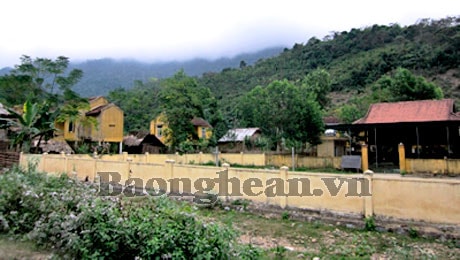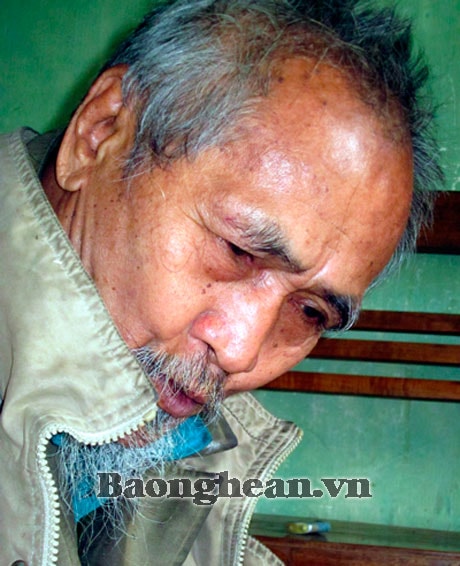Lesson 4: The Lo family and the worry of the absence of the O Du language
The Lo clan is about to celebrate its 7th Tet in its new settlement in Vang Mon (Yen Hoa - Tuong Duong). They are the O Du community, which has been mentioned a lot in the press, moving here at the end of 2006 from Kim Da and Kim Tien communes. A few of them come from Huu Duong, Huu Khuong and the old village is now submerged deep under the Ban Ve Hydroelectric Reservoir. The lives of 400 O Du people in the new village have changed, but there are still many things to discuss.-->> See Article 3: The dynamism of the Chinese people

Vang Mon Village, the new settlement of 400 O Du people.
I returned to Vang Mon village on a cold Sunday. Only when you go to the mountains these days can you truly feel the cold of winter. On the hillside, young shepherds huddled in loose winter coats. A few buffaloes leisurely chewed grass. On the road leading to the village, a group of women huddled around a fire embroidering skirts. But village chief Lo Van Tinh was not at home. I could only "meet" him on his cell phone. He said he was in the forest pulling poles to build a house for his son to celebrate Tet and then move out to live on his own. So the O Du village was about to have its 91st household.
Knowing that I was from the mountains, the wife of the village chief Tinh switched to speaking Thai. She told me to just call her Mrs. Tinh, because since the day she moved to her husband's house, O Du's daughter had almost completely abandoned the name her parents gave her at birth. That name only remained on her family register and identity card. Only very rarely when she returned to her mother's house did anyone call her by her real name.
The most difficult days of the O Du people in the new settlement have passed, although 80/90 households are still poor. In the new place, children can go to school, the medical station is also close so when they are sick they do not have to take a boat to the hospital. In the beginning, everything was strange. But then the O Du people also learned from the Thai people to dig for gold along the stream, plant trees, raise pigs, open a grocery store... all of which were previously quite strange to them. Gradually, the O Du people also had the first people to go to university. Most recently, Lo Thi Anh passed the entrance exam to Vinh Medical University.
However, poverty has not receded. The people of Vang Mon village still live mainly on slash-and-burn farming, with unstable productivity. As a result, people sometimes go hungry, sometimes full.
During the conversation, I asked about the O Du language because I had read somewhere that not many people in Vang Mon village still speak their mother tongue. When we were still in the old village, only the oldest generation still communicated in the O Du language. The next generation spoke Thai and Kho Mu. Now, in their new place, the number of people who can remember the O Du language can be counted on the fingers of one hand. Young people like Lo Thi Phuong, the eldest daughter of Tinh village, who just started learning the O Du language taught by the elders in the village, often confuse one word with another. Phuong said: "Nowadays, people have forgotten all the O Du language. The village has Mr. Bang who speaks it best, he is 80 years old."

Mr. Lo Van Bang, the oldest person who still remembers the O Du language.
Phuong took me to the house of Mr. Lo Van Bang, the "living treasure" of the village. Entering Mr. Bang's new-style stilt house, which was granted by the State in 2006, it was no different from a small attic of a city dweller who was completely unfamiliar to the O Du community. During the conversation, I noticed that this old man had difficulty expressing himself in Kinh, so I immediately switched to Thai. He said: "Many journalists have come to ask me. There were even Thais, Americans...". Then he explained: "It's been so long since I've used the O Du language that I can only remember about eighty to ninety percent of it." He showed me that the O Du language clearly distinguishes the concepts of "eating" and "drinking", and that they don't all say "kin" like the Thai people. Apart from the language, there is no other feature that can distinguish the O Du people from the Thai or Kho Mu people. According to Mr. Bang, only the five oldest people in the village can still communicate in the O Du language at a basic level. Besides him, there are also Mr. Nhung, Mr. Nhong, Mr. Phuc, and Mr. Nghe in the village, all of whom are over the age of sixty.
Right in the Pot village, which is now submerged in the lake, Mr. Bang, who was a shaman, had to use the O Du language a lot when performing ceremonies, so he could remember. There was an article saying that the architecture of the O Du house was oriented towards the mountain top, but according to Mr. Bang, only the shaman's house was allowed to do so, and the house was similar to the Thai people's house, the upper house could not be oriented towards the mountain top. Doing so would cause illness in the house because the mountain god would scold him. When he returned to the new village, Mr. Bang also stopped being a shaman. Occasionally, some descendants of the clan asked him to come to their house to help perform ceremonies. In the past, the O Du people did not celebrate Tet. They only slaughtered pigs to celebrate the new rice ceremony, which was the happiest occasion of the year. Later, living near the Thai people, the Khmu people started the custom of celebrating Tet. When he returned to the new village, Tet was happier but still sad, because only a few old people missed their old homeland and when they were free, they sat together and spoke the O Du language...
Mr. Bang stopped talking, took a long drag of his cigarette, and coughed. It was the kind of tobacco that we mountain people still grow on the mountain ranges for the elderly to roll and smoke or chew betel. I suddenly thought that human life is sometimes like a smoke screen, and Mr. Bang would eventually return to his ancestors, and would bring with him a language that few generations after him would be interested in.
Lo family, how many people worry about the day when the O Du language will no longer exist like Mr. Bang?!
You are






